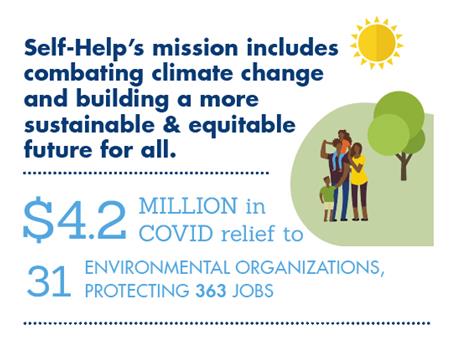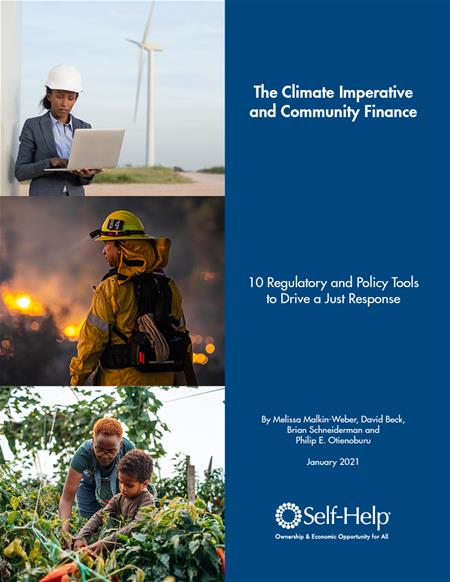
In 2020, Self-Help’s Payment Protection Program relief loans targeted small businesses and nonprofits aligned with fighting climate change and creating a cleaner environment.
Climate-Conscious Community Investment
This week the Center for American Progress (CAP) hosted a roundtable to present research and best practices in climate investment. Presenters included Sonrisa Cooper of the Greenlining Institute; Michela Zonta and Zoe Willingham representing CAP; and Melissa Malkin-Weber and David Beck from Self-Help.
Among the key messages: The need to combat climate change is urgent. We have an opportunity to accelerate investments in clean energy—but along with the risks of environmental destruction there’s the risk of perpetuating economic and racial inequities.
“It is clear that our future depends on making a successful transition to a livable clean energy economy,” Melissa said, commenting on the roundtable afterwards. “It’s also crystal clear that we need to make that economy work for everyone, leaving no one behind.”
She pointed out that there will be a “massive” investment in green initiatives that will be a major engine for economic growth. “As the nation and the world transition away from fossil fuels, we must make sure that transition provides for shared prosperity. We not only urgently need a low carbon world, we also need a better world.”
David and Melissa presented findings from a paper we released earlier this year, “The Climate Imperative and Community Finance,” which Melissa and David authored along with Brian Schneiderman and Philip Otienoburu. This report was made possible by the Hewlett Foundation and facilitated by CAP.

“The Climate Imperative” presents a set of policy recommendations to federal agencies based on our experience as a lender. All of the recommendations are short-term federal actions that can be taken to facilitate advancements in clean energy and climate-aligned projects with an emphasis on serving communities that have been and will be affected most by environmental degradation and climate change.
Join Us in Investing in a Greener World
Since 1989, Self-Help has invested $357 million in projects that have created a positive environmental impact in the communities we serve. Those investments include loans to sustainable businesses, including solar farms, recycling businesses, ecotourism, sustainable foods, land trusts and bike shops. Unlike many financial institutions, we do not invest in fossil fuels.
You can support businesses and nonprofits working for sustainability by putting your savings in a Green Term Certificate. Terms range from three months to five years and offer attractive returns. It’s an easy way to build your savings while also supporting enterprises that work every day for a greener environment.
Celebrating Earth Day
On Earth Day this year, April 22, we at Self-Help will honor the day with a variety of service activities and initiatives that encourage staff in all our locations to adopt green practices.

Self-Help Federal Credit Union staff composting in Modesto, California. Pictured from left: Maria Eckles, Minh Ngyuen and Yesenia Rachel.
For example, our Modesto, California branch, part of Self-Help Federal Credit Union, is coordinating trash pick-up in that community for three days after working hours. Staff at this branch also have been collecting old batteries for recycling. And, as shown in the photo above, they also do daily composting at work.
Quick Facts About Earth Day. Did You Know . . .
- Earth Day is the largest secular observance in the world. That puts it just behind Christmas, Hannukah, Ramadan and other major religious holidays.
- The idea for the first Earth Day was the result of a bipartisan initiative led by a junior democrat in the Senate (Gaylord Nelson) and a Republican (Pete McCloskey), who recruited activist Denis Hayes to organize the event.
- On the first Earth Day, 20 million Americans participated in demonstrations against environmental degradation of all kinds.
- A CBS Special broadcast on the very first Earth Day says that “we are in a crisis of survival.” In spite of gains made over time, that remains even more true today. - Source: www.earthday.org
Recommended Reading
A couple of compelling pieces that our staff have been reading:
“This is Environmental Racism – How a Protest in a NC Farming Town Sparked a National Movement” - Washington Post
“The Urgency of the Black Climate Agenda,” - Vox